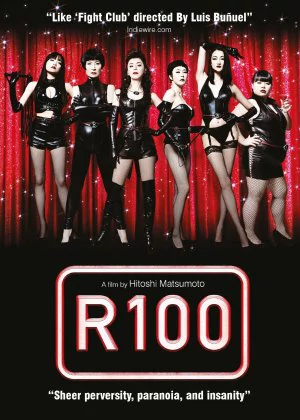R100
Movie details

Hitoshi Matsumoto (Saya-zamurai, Symbol, Dai-nipponjin) is one of the brightest talents working in Japanese comedy cinema today, so when he announced his new film I was sold even before seeing a glimpse of the poster. I skipped all the teasers and trailers too, whenever I can I try to go in as fresh as possible. The bottom line: R100 is a witty, wacky film full of outlandish surprises that only Matsumoto could've made.

Even though still a great film, Matsumoto's Saya-zamurai was clearly the least of the bunch. That meant Matsumuto had something to prove with R100. But it's difficult to directly compare R100 to his other films. On a whole I believe R100 lands right in between Saya-zamurai and his two earlier films, but individual scenes vary a lot in quality. The middle part of R100 is probably one of Matsumoto's weakest moments, the ending one of his best.
R100 stands for "Rated 100". In other words: a film that is meant only to be understood by 100-year olds. Not that the film is incredibly explicit or nasty, it's just pretty near-incomprehensible for people with a well-functioning mind. Embedded within this concept is an ode (or is it?) to Japanese director and enfant terrible Seijun Suzuki (Pistol Opera), a pretty direct reference embodied by the director character that pops up halfway through the film.
The film begins when Omori (a plain and bored salesman looking after his son while his wife lies in a coma) enters an exclusive club to bring some joy back into his life. It doesn't take him very long to figure out something weird is going on, still he ventures on. He's talked into a contract where 6 dominatrixes will spice up his life over the course of one year. Omori is not to engage with them in any way, he just has to submit himself to their actions. What he doesn't realize is that their plans run way beyond providing a little pleasure.

Visually there are two sides to R100. Matsumoto uses a couple of nice filters to give the film a more subdued, mysterious look and the CG is once again extremely functional (as in funny), but overall the film can look just a little too cheap and the CG can be a bit bare-bones at times. When Matsumoto is minding the visuals the films looks great, but in some scenes he seems to forget about them altogether.
The soundtrack on the other hand is the perfect companion. The music itself is mostly popular classical music (Beethoven is referenced a lot) but the way Matsumoto integrates it into his films is perfect as always. The ending in particular takes great advantage of the music used (much like Symbol). Matsumoto makes a perfect case of how you don't need to conform to everyone's musical taste to make a splendid soundtrack.
Matsumoto's growing status can be deducted from R100's cast. Nao Omori is a perfect fit for the overly serious lead, the scene where he's confronted by Shinobu Terajima (Yawarakai Seikatsu, Heruta Sukeruta) is sure to bring a smile to fans of Ryuichi Hiroki's Vibrator. There's also a star role for Suzuki Matsuo (underrated both as actor and director) and strong cameos for Lindsay Kay Hayward, Eriko Sato and Matsumoto himself.

Around halfway through the film's true identity finally surfaces. Strangely enough, it's also the moment when things start to drag just a little. While the twist brings some great meta-jokes to the table, the main story doesn't really evolve all that much. A small yet regrettable 15-minute slump that weighs the film down. It's only a short hick-up though as Matsumoto quickly picks up the pace again, steaming his way towards a most satisfying finale.
R100 is a pretty ambitious film (like most of Matsumoto's features) that drops the ball just a little halfway through. It's a shame because there are moments of absolute genius here. If anything though, Matsumoto confirms that he is more than a one-trick pony who can handle different types of comedy without losing his signature style. R100 is a crazy film, full of deadpan comedy, weird references and an internal logic that convinces without making any actual sense. It's one of those "only in Japan" type of films though, so don't go in expecting penis in pie jokes.